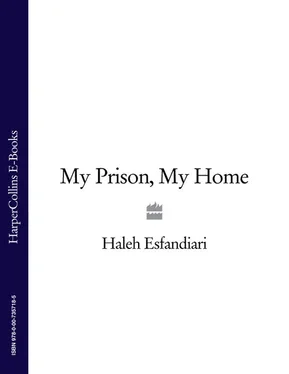I WAS BORN MARCH 3, 1940, in Tehran. My mother is Viennese and my father is from Kerman, in eastern Iran. Father came from an old established landed family, many of whose members also served in the government. My paternal great-grandfather, Vakil ol-Molk-e-Dovvom, was the governor of Kerman in the 1870s, and my grandfather Raf’at Dowleh was vice governor of the province before becoming a member of parliament. My paternal grandmother came from a clerical family; her brother was the highest-ranking cleric in Kerman. On the European side, my maternal grandfather, who died in World War I, owned a hotel in Marienbad, in Czechoslovakia, and my mother’s older brother was a cloth merchant in Prague.
For the first six years of my life I lived in Karaj, twenty-five miles from Tehran, where my father was a professor of botany at the College of Agriculture.
My father couldn’t have chosen a better place than Karaj to ease his Austrian bride into Iran, which in the 1930s remained traditional and offered few amenities. The college was a small, closed community, with a river and beautifully landscaped wooded areas. The faculty lived either in two-story houses or bungalows separated by hedges. In thesummer, the gardeners sprinkled water over the college’s unpaved streets to help settle the dust and cool the air.
By the time I was born, Mother had spent two years in Iran. She had thrown herself wholeheartedly into the culture and customs of her adopted country. But she ran a European household, and we spoke German at home and followed European customs. The stories she told were of Snow White and the Seven Dwarves, Cinderella, and Hansel and Gretel. I learned Persian stories from my nanny, who doubled as cook and housekeeper.
I loved the garden for its small streams, square ponds, flower beds, rose gardens and old trees, especially the catalpa, poplar, pine, and plane trees. With my nanny in tow, I would play hopscotch in the walkways of the garden and games of hide-and-seek with other children. This was paradise, I thought; but every time I said as much to my nanny, she would scold me, take me by the hand, and make me rinse my mouth to wash away my “blasphemous” words.
It didn’t take long for my outgoing mother to make friends with a number of the professors and their families. The members of the faculty were mostly European-educated and could converse with her in German or in French. Mother had an affinity for those who spoke her native language.
The Schricker family, headed by Hans Shricker, an Austrian forestry specialist, lived next door to us and their eldest son, Adalbert, married my father’s sister, Touran. Mother had lost both her parents at a relatively young age and was raised by her sisters in Vienna. The Schrickers became her surrogate parents. Mr. Schricker, a skilled carpenter, built a bassinet when my mother was pregnant with me, and once I was born, Mrs. Schricker showed Mother how to bathe a newborn, and how to diaper and dress me. Under Mrs. Schricker’s tutelage, Mother sewed and knitted clothes for me, since ready-made children’s clothing was a rarity in those days. Mrs. Schricker—warm, loving, practical, and down-to-earth—eased the pain of living away from home.
Unlike traditional Persian homes, our garden didn’t have a wall around it, but pine trees served to shield it from the street. We had a large living room and a dining room, several bedrooms, and a bathroom with a bathtub and a Persian-style toilet, basically a basin sunk in the floor.
In the evenings Mother and Father would sit in the living room and listen to the radio, while I would play in a corner with my toys. My parents’ friends, especially the Schrickers, would come over to listen to the European news broadcasts. Hitler had invaded Russia in June 1941, and one flank of the German’s three-pronged attack was aimed at the oilfields of the Caucasus on Iran’s border. In Karaj they all worried that the German army would overrun the Caucasus and advance into Iran.
The Allies were already concerned about German influence in Iran. Once Hitler invaded Russia, they desperately needed Iran’s overland routes to supply the hard-pressed Russian army. Unable to persuade a proud and stubborn Reza Shah—the military officer who seized power in 1921, sent the Qajar dynasty packing, and founded a new dynasty in 1925—to abandon Iran’s state of neutrality and join the Allied cause, Russia and Britain invaded Iran in August 1941, the Russians from the north, the British from the south. When Russian troops appeared at Karaj, Father remained at his teaching post in the College of Agriculture, but he sent Mother and me to Tehran, to my grandparents’ house. I was happy to be reunited with my older stepbrother, Siamack, who was going to school in Tehran and already living with my grandmother.
By the time I was born, my grandparents were living near the University of Tehran. They had moved to Tehran from Kerman when my grandfather was elected to parliament.
My grandmother’s home was another world, utterly different from our European household, where we spoke German, followed strict rules, sat around the table to have our meals, and ate Austrian food—schnitzel, boiled meat, soup, roast potatoes, and creamed spinach. Grandmother—Khanum Jan as we called her—ran a traditional Persian household. While my grandfather, who passed away just four years later, when I was five, was no longer the wealthy man he had been (his extensive land holdings had been seized under the previous reign), there was a great deal of coming and going, with visitors from their hometown constantly bringing the best dates and Kerman’s distinctive sweets and pastries. At any given time, the cook would prepare meals for ten or more people. My favorite place was the kitchen, which was dark and smoky from the woodstove, and where the cook would often slip me a spoonful of white rice from the cooking pot. I loved the rice, the aash , a thick soup made of greens; the white cheese and walnuts, yogurt, and the fresh sangak flat bread from the corner bakery that came with every meal.
At home, Mother had been so worried we would get typhoid she insisted on cooking all the fruits and vegetables. At my grandparents’, I was free from all the don’ts I heard at home. We ate sitting crossedlegged around a rectangular tablecloth spread on the floor. Mother sat on a chair at a small table set up just for her.
The house had a large garden with a pond where the household, including my grandmother, made their ablutions before each of the five daily prayers. The garden was divided into four large triangular flower beds. In each, a persimmon tree or a pomegranate tree stood among the flowers, rosebushes, and forsythias. The walls of the garden were thick with grapevines. In the fall, Grandmother would have a servant climb up a ladder and put a small sack around each cluster of grapes so that they would keep, even as the cold weather set in. Before the first frost she would have the sacks removed and the grapes picked. That way, she always had grapes to serve out of season.
The servants’ rooms and the outhouse were at the far end of the garden. There were two toilets in the house, but Grandmother was too old fashioned to let anyone use them. Peddlers came to my grandmother’s door every morning with donkey loads of melons, string beans, cucumbers, and fruit. Then there was the itinerant purveyor of shahr-e farang , or “the wonders of Europe,” which consisted of a copper viewing box on four legs topped with minarets and bells. For a few rials, we could look into the darkened box and view moving images of exotic places and people. The shahr-e farang man offered a running commentary as the pictures galloped across the tiny screen. “Oh, see the queen of England majestically sitting on her throne, her crown on her head,” he would say in a singsong voice and in rhyming couplets. “Now see the fierce tiger of Africa and the lion, king of the jungle.”
Читать дальше












